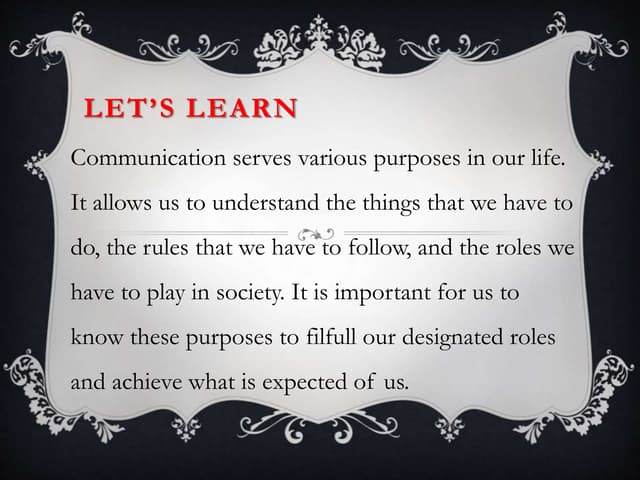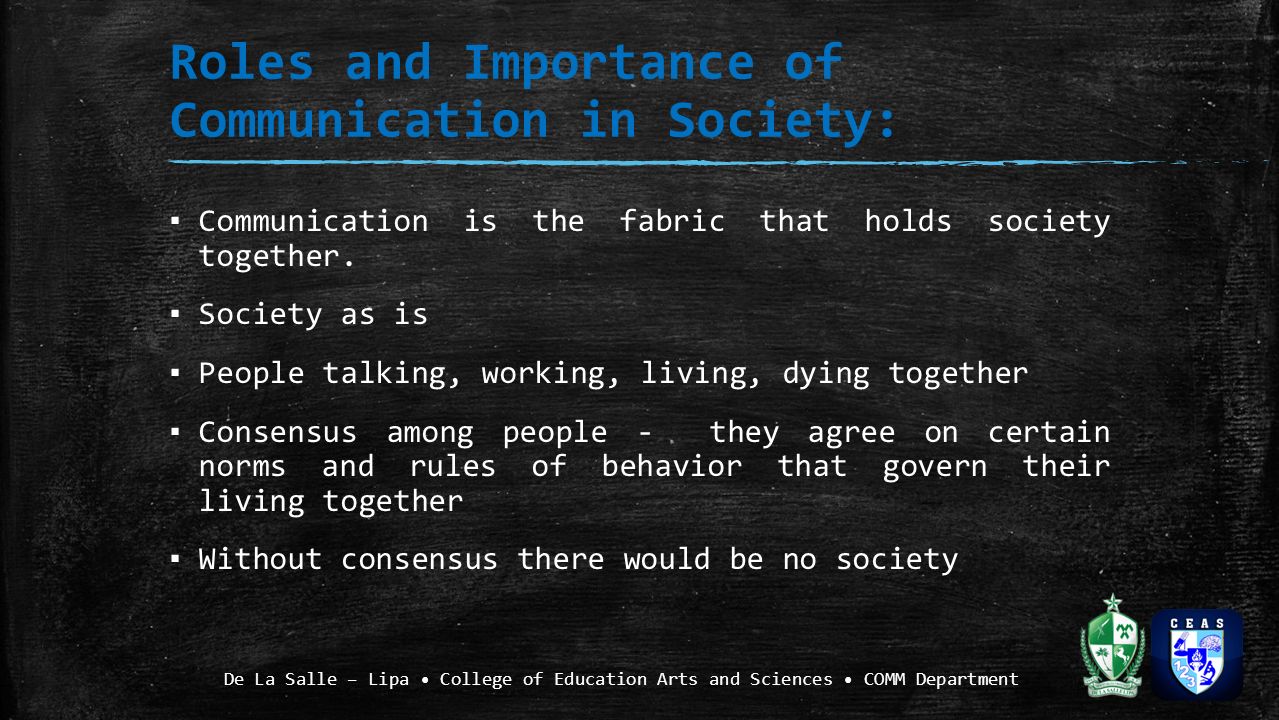Why is Communication Important to Society?
Communication is vital to society as it facilitates the exchange of ideas and information, fostering understanding and cooperation among individuals. It is the backbone of human interaction, enabling the sharing of thoughts, feelings, and needs, which in turn helps build relationships, resolve conflicts, and promote social harmony.
Effective communication plays a crucial role in transmitting knowledge, shaping cultural norms, and mobilizing collective action. It allows societies to progress by enabling collaboration, innovation, and problem-solving. Without communication, societal functioning would be severely constrained, hindering social cohesion and impeding the achievement of shared goals.
Emphasizing the importance of communication is key to promoting mutual respect, inclusion, and dialogue, which are the foundation for a healthy and thriving society.
Key Benefits Of Effective Communication
Effective communication is crucial to the functioning of society as it promotes understanding, cooperation, and progress. It allows individuals to express their needs, ideas, and emotions, fostering social cohesion and building strong relationships. Additionally, effective communication ensures that information and knowledge can be shared, leading to informed decision-making and collective growth.
Enhances Relationships:
Effective communication plays a crucial role in enhancing relationships within society. Here are some key benefits of effective communication:
- Builds trust and rapport: When individuals communicate effectively, they are more likely to build trust and rapport with others. Clear and open communication allows people to express themselves, share their thoughts and feelings, and establish deeper connections with others.
- Resolves conflicts: Effective communication helps to resolve conflicts in relationships. When individuals communicate their needs, concerns, and perspectives honestly and respectfully, it fosters understanding and paves the way for finding common ground and resolving conflicts.
- Improves emotional intimacy: Through effective communication, individuals can express their emotions, listen empathetically to others, and develop a deeper emotional connection. This leads to improved emotional intimacy and greater satisfaction in relationships.
- Strengthens bonds: Regular communication helps to strengthen bonds between individuals. When people make an effort to communicate regularly, share experiences, and engage in meaningful conversations, it nurtures the bonds of friendship, family, and community.
Promotes Understanding And Empathy:
Another crucial benefit of effective communication is that it promotes understanding and empathy within society. Here’s how:
- Facilitates clarity and comprehension: Effective communication ensures that messages are conveyed clearly and understood accurately. By using clear and concise language, individuals can avoid misunderstandings and confusion, leading to improved comprehension and understanding.
- Encourages active listening: Effective communication involves active listening, which means giving full attention to the speaker, understanding their message, and responding appropriately. Active listening promotes empathy as individuals seek to understand the perspectives and experiences of others.
- Reduces prejudice and stereotypes: When individuals engage in effective communication, they have the opportunity to challenge and debunk stereotypes and prejudices. By exchanging ideas, sharing experiences, and gaining different perspectives, communication helps to bridge gaps and promote inclusivity.
- Enhances cultural competence: Effective communication allows individuals to learn about and appreciate different cultures, beliefs, and values. Through open dialogue and active listening, people can develop cultural competence, fostering greater understanding and respect for diversity.
Fosters Collaboration And Teamwork:
Effective communication is vital for fostering collaboration and teamwork among individuals in society. Here’s why:
- Encourages information sharing: Effective communication ensures that relevant information is shared among team members. By providing updates, clarifying expectations, and sharing resources, communication facilitates collaboration and enables teams to work towards common goals.
- Improves problem-solving: When individuals communicate effectively, they can collectively brainstorm ideas, discuss challenges, and find solutions. Communication channels enable the exchange of perspectives, expertise, and insights necessary for effective problem-solving.
- Strengthens decision-making: Effective communication supports informed decision-making processes. When team members share their opinions, research findings, and expertise, decision-making becomes more inclusive and comprehensive, resulting in better outcomes for all stakeholders.
- Increases productivity: Clear communication within teams helps to streamline workflows, clarify roles and responsibilities, and ensure that everyone is on the same page. This fosters efficiency and productivity, leading to successful completion of tasks and projects.
Effective communication enhances relationships, promotes understanding and empathy, and fosters collaboration and teamwork within society. By recognizing the importance of effective communication, individuals can contribute to creating a more connected and harmonious society.
Communication As A Tool For Social Change
Communication plays a crucial role in shaping society by promoting social change. Effective communication enables the sharing of ideas, encouraging empathy and understanding among individuals, ultimately leading to a more inclusive and progressive society.
Communication plays a vital role in society, serving as a powerful tool for driving social change. It facilitates problem-solving, drives positive societal narratives, and empowers marginalized communities. Let’s explore each of these aspects in greater detail:
Facilitates Problem-Solving:
- Communication enables individuals to identify and address societal issues, fostering collaboration and cooperation.
- It allows for the exchange of ideas, knowledge, and perspectives, leading to innovative solutions.
- By promoting open dialogue, communication helps to bridge gaps and find common ground among diverse groups.
Drives Positive Societal Narratives:
- Effective communication helps shape the narratives that define a society’s values, beliefs, and aspirations.
- It allows for the dissemination of accurate information, challenging misinformation and encouraging informed perspectives.
- Communication can be utilized to highlight and amplify positive stories, inspiring change and promoting unity.
Empowers Marginalized Communities:
- Communication gives marginalized communities a platform to express their needs, concerns, and aspirations.
- It amplifies their voices, allowing them to challenge existing power structures and demand equity and justice.
- Inclusive and accessible communication channels empower marginalized communities to share their narratives and advocate for their rights.
By recognizing the crucial role of communication in society, we can harness its power to effect positive change. Engaging in open and inclusive dialogue, addressing problems collectively, and amplifying marginalized voices are all essential steps toward building a more equitable and just society.
Remember, communication is not just a means of conveying information; it is a catalyst for social transformation. Let us embrace its power and work together for a better future.
The Role Of Communication In Society’S Development
Communication plays a vital role in the development of society by fostering understanding, cooperation, and progress. Effective communication enables individuals and communities to exchange ideas, disseminate knowledge, and build connections, leading to social, economic, and cultural growth. Society relies on communication to thrive and address complex challenges collectively.
Communication plays a vital role in the development of society. It serves as the cornerstone of progress and prosperity, contributing to various aspects of societal growth. From enhancing economic growth to supporting education and learning, and shaping cultural preservation and development, communication acts as a catalyst for positive change.
Let’s explore these aspects in detail:
Enhances Economic Growth And Prosperity:
- Efficient communication systems facilitate the smooth flow of information between businesses, customers, and stakeholders, fostering economic growth.
- Effective communication allows businesses to better understand market demands, providing them with opportunities to innovate and meet customer needs.
- Clear and open communication within organizations enhances collaboration, teamwork, and productivity, driving economic prosperity.
Supports Education And Learning:
- Communication is key in education, enabling teachers to convey knowledge and ideas to students. It facilitates interactive learning and engagement.
- It empowers students to express their thoughts, ask questions, and seek clarification, leading to a deeper understanding of subject matter.
- Communication technology promotes access to educational resources and remote learning opportunities, ensuring education reaches all corners of society.
Shapes Cultural Preservation And Development:
- Communication plays a vital role in preserving and passing on cultural traditions, practices, and stories from one generation to another.
- It facilitates cultural exchange and understanding, allowing societies to celebrate diversity and foster inclusive communities.
- Through effective communication, cultural ideas and values can be shared, influencing the development of societies in a positive way.
Communication is essential for the advancement of society. It enhances economic growth and prosperity, supports education and learning, and shapes cultural preservation and development. By realizing the significance of effective communication and leveraging its power, societies can thrive and evolve, creating a brighter and more connected future.

Credit: www.slideshare.net
Frequently Asked Questions Of Why Is Communication Important To Society
Why Is Communication Important In Society?
Communication is essential in society as it promotes understanding, fosters relationships, and enables cooperation. It allows people to express their ideas, emotions, and needs effectively, leading to social cohesion, resolving conflicts, and achieving collective goals. In short, communication is the key to a thriving and harmonious society.
How Does Communication Impact Society?
Communication plays a vital role in shaping society. It enables the dissemination of information, enabling people to stay informed, make informed decisions, and participate in democratic processes. It also facilitates cultural exchange, encourages social progress, and improves the overall quality of life by connecting individuals and communities.
What Are The Benefits Of Effective Communication In Society?
Effective communication leads to numerous benefits in society. It promotes trust and understanding among people, reduces misunderstandings and conflicts, fosters empathy and mutual respect, and enhances cooperation and collaboration. It also facilitates problem-solving, decision-making, and innovation, contributing to a more cohesive and prosperous society.
Conclusion
Effective communication is undeniably crucial to society. It enables individuals to connect, collaborate, and understand one another’s thoughts, emotions, and opinions. By promoting empathy and mutual understanding, communication fosters a more inclusive and cohesive community. Furthermore, effective communication is the foundation of successful relationships, both personal and professional.
It allows us to share information, resolve conflicts, and maintain trust and cooperation. Moreover, communication serves as a vital tool for social and political progress. It empowers individuals to voice their concerns, advocate for their rights, and contribute to meaningful change.
In an increasingly interconnected world, the ability to communicate effectively has become more important than ever before. By developing strong communication skills and embracing open dialogue, we can build stronger communities, foster empathy, and contribute to the betterment of society as a whole.


